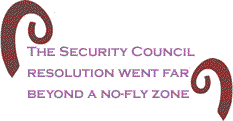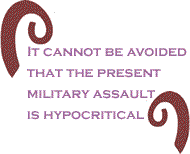|
On Sunday, the British Observer newspaper
remarked editorially, �Without calls to action by the Arab
League, it is doubtful President Obama would have shifted
his initial stance of wary caution.  But
that consensus might not hold in the event of prolonged
confrontation.� Prolonged? Hey, it didn�t last three days. But
that consensus might not hold in the event of prolonged
confrontation.� Prolonged? Hey, it didn�t last three days.
By midday, while U.S. Tomahawk missiles
were raining down around Tripoli, the
Associated Press was reporting that the head of the Arab
League, Amr Moussa, had criticized international strikes
on Libya,
saying the attacks had gone beyond what the league had endorsed.
Moussa told reporters that �what happened differs from the
no-fly zone objectives.� He says �what we want is civilians�
protection not shelling more civilians.� Moussa said the
UN resolution also agreed to protect civilians, which it
has failed to do.
Up until that point the Arab League
support story and its cover for the White House had been
repeated far and wide.
On Sunday morning, Peter Bergen,
a �CNN National Security Analyst� was on the air saying,
�First, the Obama administration was handed a gift by the
Arab League, which in its more than six-decade history has
garnered a well-earned reputation as a feckless talking
shop, but unusually took a stand one week ago by endorsing
a no-fly zone over Libya. That endorsement put
the Arab League way out in front of the Obama administration,
which was then dithering about whether to do anything of
substance to help the rebels fighting Gadhafi.�
�On March 14, the Arab League called
for imposing a no-fly zone over Libya. What welcome, but largely overlooked, news,�
wrote Stanley Kutler, author of The Wars of Watergate
on Truth Dig. �Remembering the political adage watch their
feet, not their mouths,� we know there is no substance to
the Arab League position. What the Arabs really were asking
is that the United States, now the world�s foremost mercenary,
do something about their despised Arab colleague, and perhaps
incidentally aid the Libyan rebels.
�The Arab League behaved as a mouthpiece
for the seemingly discredited Paul Wolfowitz and his band
of merry neocons (the Arab League and Wolfowitz - there
is irony for you!), now anxious to wade into Libya
with guns blazing and with what available troops, ordinance
and airplanes can be mustered.  For
them, the march for empire is inevitable, inexorable and
withal indubitably beneficial to us and the world. Wolfowitz
defies F. Scott Fitzgerald�s dictum, as unfortunately there
are bad second acts in American life. For
them, the march for empire is inevitable, inexorable and
withal indubitably beneficial to us and the world. Wolfowitz
defies F. Scott Fitzgerald�s dictum, as unfortunately there
are bad second acts in American life.
�Until the passage of the U.N. resolution,
President Barack Obama seemingly ignored and deflected the
war chants and gratuitous advice of the Wolfowitz crowd.
Perhaps Obama recognizes the limits not only for our capacity
for war, but for mobilizing the energy and will to conduct
- and finish - one.�
Moussa�s statement should be taken
with a handful of salt. Nobody involved in the United Nations
Security Council deliberations that produced the �no fly�
resolution had any doubt that more than securing the skies
over Libya was all that was involved. It was clear what
the �all necessary measures� to protect civilians clause
could � and most likely would � mean, in fact. What more
likely happened is that the league, having responded to
the U.S.
appeal for political cover, had second thoughts when it
became clear that, as the Libyan government claimed, in
a matter of hours scores of civilians had lost their lives
in the bombardment. Inevitably, that would cause problems
for some Arab governments. One report suggested that it
was �pictures of charred bodies� that caused Moussa�s demur.
On the other hand, some powerhouses in the league had every
reason to go along with the �no fly� resolution, as it might
distract attention from the carnage being carried out by
the pro-U.S. autocrats in Bahrain with the heavy-handed
assistance from the princes of Saudi Arabia and others in
the Arab Gulf.
I�ve been asked a number of times
about the attitude of the political left to the unfolding
events in the region around Libya.
As nearly as I can ascertain, it is pretty unanimous: identification
with the aspiration of the opposition forces in Libya
and total rejection of U.S.
and European armed intervention and its backing from the
members of the Arab League.

Another important response has been
that of India.
On Sunday the Indian government said officially it regretted
the air attacks carried out by NATO against Libya,
and called on the warring parties to resolve their differences
peacefully. Like Germany,
Brazil, China
and Russia,
India abstained during the
Security Council resolution vote. Any measures to be taken
should mitigate, not exacerbate, the situation of the Libyan
population, Indian officials said.
Nassan Nasrallah, general secretary
of the Lebanese resistance movement, Hezbollah, condemned
the NATO bombing warning it could set the stage for interference
in �all Arab countries�. He told a Beirut
television channel that certain Arab governments would feel
repercussions in the future for their complicity in the
anti-Libya actions. According to Prensa Latina, at
a rally in the Lebanese capital, Nasrallah expressed solidarity
with the popular revolts in several Arab countries, and
strongly criticized the attitude of various governments
to suppress domestic expressions and yield to foreign pressures.
The predictable on-time expert commentator,
Phyllis Bennis, of the Institute for Policy Studies had
this to say at the beginning of the week:
The legitimacy of the Libyan protesters�
demand does not mean that the decision by the United Nations
and the powerful countries behind it was legitimate as well.
The Libyan opposition, or at least those speaking for it,
asked for a no-fly zone, for protection from the Qaddafi
regime�s air force, to allow them to take on and defeat
their dictatorship on their own terms.  Many
of us opposed that idea, for a host of reasons including
the dangers of escalation and the threat of a new U.S. war in the Middle East.
But whatever one thinks about that demand, the Security
Council resolution went far beyond a no-fly zone. Instead,
the United Nations has essentially declared war on Libya. Many
of us opposed that idea, for a host of reasons including
the dangers of escalation and the threat of a new U.S. war in the Middle East.
But whatever one thinks about that demand, the Security
Council resolution went far beyond a no-fly zone. Instead,
the United Nations has essentially declared war on Libya.
There continues to be breathtaking
hypocrisy from the U.S.
and its allies in responding to the disparate Arab movements.
The U.S. demanded not only that the Arab League endorse
any authorization to use force in Libya, but also that Arab countries agree to actually
participate in any UN-authorized or NATO-led military action.
Apparently at least two governments from Arab Gulf states have agreed. Qatar
is one of them. The other likely one is United
Arab Emirates who, along with Saudi
Arabia, just sent hundreds of troops
into democracy-shaken Bahrain,
to help the king there keep his monarchy�s hold on absolute
power. The U.S., fearful of losing Bahrain�s strategic port as home for the Navy�s
Fifth Fleet, has yet to condemn the foreign troops imported
to Bahrain to suppress
the democracy protesters. So far, the Obama administration�s
only response to the soldiers pouring into Bahrain has been to urge the heavily armed foreign
troops to support dialogue between the Bahraini people and
their discredited king.
The Libyan opposition, or at least
much of it, has made a legitimate demand for international
support, for all the right humanitarian reasons. Many people
in many parts of the world have supported their right to
some kind of assistance. Governments, however, are not people,
and do not make strategic decisions for humanitarian reasons.
Governments do not use scarce resources and most especially
do not deploy military force, to achieve humanitarian goals.
So the cold strategic calculations of powerful governments
cannot be viewed as a legitimate response to the humanitarian
needs of Libya�s
people or the humanitarian impulses of international civil
society.

On Sunday, the African Union panel
on Libya
called for an �immediate stop� to all attacks by United
States, France
and Britain. The group also asked
Libyan authorities to ensure �humanitarian aid to those
in need,� as well as the �protection of foreigners, including
African expatriates living in Libya.�
In their statement the African leaders stressed need for
�necessary political reforms to eliminate the causes of
the present crisis� but at the same time called for �restraint�
from the international community to avoid �serious humanitarian
consequences.� According to AFP, the gathering also announced
that a special meeting will be held in the Addis Ababa March
25, involving representatives from the Arab League, the
Organization of Islamic Conference, the European Union and
the United Nations to �put in place a mechanism for consultation
and concerted action� to resolve the Libyan crisis.
The demise of the Gadhafi regime
would benefit the people of Libya, the Middle East and Africa.
No doubt about it. But it cannot be avoided that the present
military assault is hypocritical in the extreme, and has
imperial motives related to the country�s oil reserves.
 The
last thing the planet needs today is another attempt by
major powers to extract �regime change� under the cover
of a cartoonish �coalition,� in this cause one that cannot
survive a week and the inevitable slaughter of the innocents
with the excuse of morally repugnant �collateral damage.� The
last thing the planet needs today is another attempt by
major powers to extract �regime change� under the cover
of a cartoonish �coalition,� in this cause one that cannot
survive a week and the inevitable slaughter of the innocents
with the excuse of morally repugnant �collateral damage.�
BlackCommentator.com Editorial Board member
Carl Bloice is a writer in San Francisco, a member of the National Coordinating Committee of
the Committees of Correspondence for Democracy and Socialism and formerly worked for
a healthcare union. Click here to contact Mr. Bloice.

|

